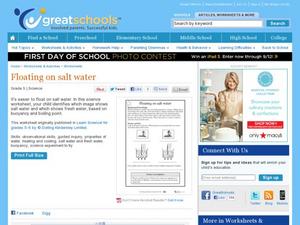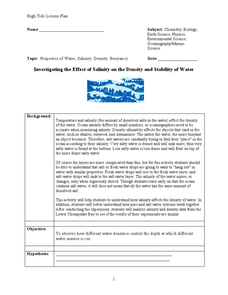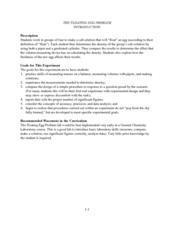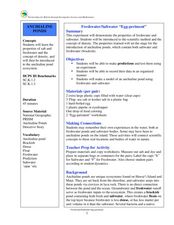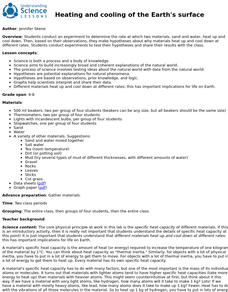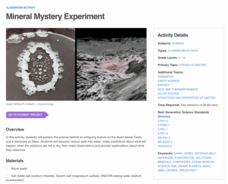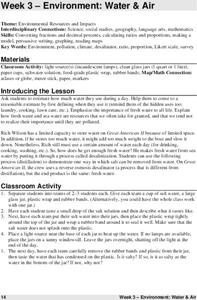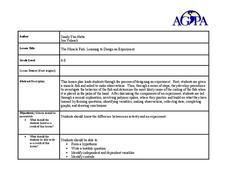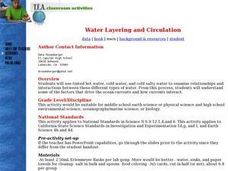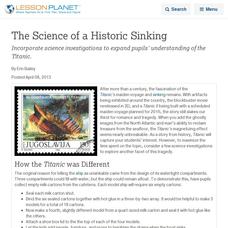NASA
Melting Ice: Designing an Experiment
Sometimes, despite the best laid plans, the unexpected will occur. Learners witness this firsthand as they carefully design an experiment to determine the time needed for ice to melt in salt water or pure water. They uncover facts not...
Curated OER
Floating on Salt Water
Mixing substances together causes their properties to change. This resource illustrates that concept for fifth graders by having them consider four questions that have to do with buoyancy and boiling point. Learners begin to understand...
Curated OER
How Dense is Salt Water?
Young schoolers explore the concept of linear regression. They determine the mass and density of salt water. Pupils add salt to water and record the density as salinity increases, and perform a linear regression on the data to model the...
Curated OER
Investigating the Effect of Salinity on the Density and Stability of Water
Water with varying amounts of dissolved salt are dyed and then used to compare densities. The objective is to discover the effect of salinity, and therefore density, on ocean water on the stability of the ocean. Many branches of science...
Curated OER
Digital Video Lesson Plan: Brine Shrimp
Students participate in classroom experiment to gain better understanding of type of environment brine shrimp can best survive. Students then explore effects of common saltwater pollutants on survival of animals in sea.
Curated OER
Tracking the Salt Front
Using the Hudson River as the focus, learners discuss the difference between salt water and fresh water environments, analyze maps and graphs, and complete addition and subtraction problems. This lesson comes with a wealth of...
Centers for Ocean Sciences
Ocean and Great Lakes Literacy: Principle 1
Is your current lesson plan for salt and freshwater literacy leaving you high and dry? If so, dive into part one of a seven-part series that explores the physical features of Earth's salt and freshwater sources. Junior hydrologists...
Curated OER
The Floating Egg Problem
This is the grown-up version of the classic "float an egg in salt water" experience, plus an experiment in soap making. High schoolers explore density, but more importantly, practice accuracy, precision, and the use of significant...
Curated OER
Freshwater/Saltwater "Eggs-Periment"
Students explore water properties by conducting a class experiment. For this buoyancy lesson, students utilize freshwater, saltwater, plastic cups, hard boiled eggs and food coloring to experiment with the floating capabilities of salt...
University of California
Heating and Cooling of the Earth's Surface
Scholars collect data from heating sand and water before forming testable hypotheses about why sand heats up faster. Afterward, they develop and run experiments to test their hypotheses.
NASA
Mineral Mystery Experiment
One way to study something is to try to replicate it. Young scientists do just that as they use solutions to recreate mineral structures on a dwarf planet. They make solutions with different types of salt, evaporate them, and observe the...
Curated OER
Saltwater Science
Students conduct an experiment that shows them how salt water allows things to float. In this salt water lesson plan, students mix ingredients together to create salt water and observe how it makes the oceans dense. They then interpret...
Curated OER
Salt Water Wedge
Students conduct an experiment to observe the properties of both salt and freshwater. They explain why freshwater will stay at the surface while salt water will travel up a river bottom because of density. Students also research the...
Curated OER
Environment: Water & Air
The introduction to the lesson mentions a sailor's limited capacity to store drinking water on his ship. Pupils then set up an overnight experiment to remove freshwater from salt water by distillation. There is a math and map activity to...
Teach Engineering
Cell Membrane Experimental Design
Grandma said to gargle with salt water for a sore throat. Was she right? In the last part of the seven-part unit, lab groups design an experiment to test a cells reaction to salt solutions. The pupils conduct their experiment to answer...
NOAA
Please Pass the Salt
Salinity is the focus of two experimenters that work to answer the question, How does salt change the physical properties of water? Super scientists compare the freezing rate of salt and fresh water, combine the two waters to observe how...
Curated OER
Do Salt Water Fish Drink?
Students conduct an experiment with potato cores and a sucrose solution to investigate how salt water fish process water. They develop a lab report of their experiment.
Curated OER
The Miracle Fish: Learning to Design an Experiment
Students develop procedures to explore the behavior of fish. In this scientific experiment lesson students from a hypothesis, write a question, identify different variables and controls in their experiment.
CK-12 Foundation
Mineral Formation: Evaporating Lake
Get crazy for crystals! Junior geologists learn the secrets of crystal formation through lecture, reading, and examples. Other topics include common ionic compounds found in fresh and salt water, the effects of location on forming...
Curated OER
Water Layering and Circulation
Students examine relationships and interactions between different types of water. They experiment with colored water of different temperature and salinity and discuss how the results relate to real ocean currents.
Curated OER
The Great Ocean Conveyor
Learners investigate water density. In this water density lesson plan, students conduct an experiment with food coloring, water and salt to see how the salt effects bodies of water.
Curated OER
The Science of a Historic Sinking
Incorporate science investigations to expand pupils' understanding of the Titanic.
Curated OER
Sink or Float Experiment
Students participate in an experiment to determine which objects float or sink. They use different amounts of salt for the objects and discover as the salt content increases, objects will float. They record their predictions and what...
Curated OER
Osmosis and Dialysis
How do you engage pupils in a discussion about osmosis without leaving them overwhelmed? By providing them with the tools to perform an exciting experiment, and they will see osmosis in action! Young chemists and biologists use a potato...



